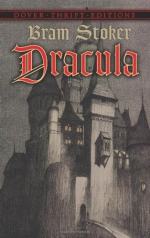I was evidently expected, for when I got near the door I faced a cheery-looking elderly woman in the usual peasant dress—white undergarment with a long double apron, front, and back, of coloured stuff fitting almost too tight for modesty. When I came close she bowed and said, “The Herr Englishman?”
“Yes,” I said, “Jonathan Harker.”
She smiled, and gave some message to an elderly man in white shirtsleeves, who had followed her to the door.
He went, but immediately returned with a letter:
“My friend.—Welcome to the Carpathians. I am anxiously expecting you. Sleep well tonight. At three tomorrow the diligence will start for Bukovina; a place on it is kept for you. At the Borgo Pass my carriage will await you and will bring you to me. I trust that your journey from London has been a happy one, and that you will enjoy your stay in my beautiful land.—Your friend, Dracula.”
4 May—I found that my landlord had got a letter from the Count, directing him to secure the best place on the coach for me; but on making inquiries as to details he seemed somewhat reticent, and pretended that he could not understand my German.
This could not be true, because up to then he had understood it perfectly; at least, he answered my questions exactly as if he did.
He and his wife, the old lady who had received me, looked at each other in a frightened sort of way. He mumbled out that the money had been sent in a letter, and that was all he knew. When I asked him if he knew Count Dracula, and could tell me anything of his castle, both he and his wife crossed themselves, and, saying that they knew nothing at all, simply refused to speak further. It was so near the time of starting that I had no time to ask anyone else, for it was all very mysterious and not by any means comforting.
Just before I was leaving, the old lady came up to my room and said in a hysterical way: “Must you go? Oh! Young Herr, must you go?” She was in such an excited state that she seemed to have lost her grip of what German she knew, and mixed it all up with some other language which I did not know at all. I was just able to follow her by asking many questions. When I told her that I must go at once, and that I was engaged on important business, she asked again:
“Do you know what day it is?” I answered that it was the fourth of May. She shook her head as she said again:
“Oh, yes! I know that! I know that, but do you know what day it is?”
On my saying that I did not understand, she went on:
“It is the eve of St. George’s Day. Do you not know that tonight, when the clock strikes midnight, all the evil things in the world will have full sway? Do you know where you are going, and what you are going to?” She was in such evident distress that I tried to comfort her, but without effect. Finally, she went down on her knees and implored me not to go; at least to wait a day or two before starting.




